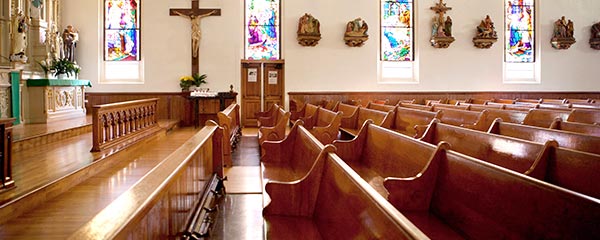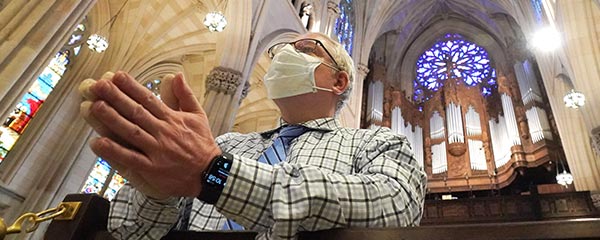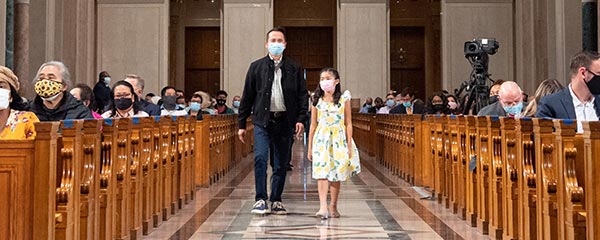Story Highlights
- Perception that religion is gaining influence on American life sinks to 16%
- Last year saw spike to 38% in perceptions of heightened religious influence
- Current figure one of lowest in Gallup's trend
WASHINGTON, D.C. -- After doubling last spring and staying elevated in December, the percentage of Americans who believe that religion is increasing its influence on American life has retreated to 16%, in line with pre-pandemic levels.

Line graph. Sixteen percent of U.S. adults say religion is increasing its influence on American life, down from 38% in May 2020 and 27% in December 2020. In late 2018 and late 2019, a consistent 19% said religion was increasing its influence.
Eighty-two percent of U.S. adults now say religion is losing its influence, up from 58% in April 2020.
The latest results are based on Gallup's annual Values and Beliefs poll, conducted May 3-18. The 2020 spike could have been a reaction to the coronavirus pandemic, as Americans likely perceived people were turning to religion to help them cope with the crisis.
Every major subgroup of Americans showed an increased belief that religion was becoming more influential in U.S. life last year, followed by a sharp decline in those attitudes this year. As a result, nearly every group has views that are similar today to what they were in 2019. Two notable exceptions are Republicans and Americans with no religious preference, as both are now less likely to perceive religion as influential.
| 2019 | Apr 2020 | May 2021 | Increase, 2019 to 2020 |
Decrease, 2020 to 2021 |
|||||||||||||||||||||||||||||||||||||||||||||||||||||||||||||||||||||||||||||||||||||||||||||||
|---|---|---|---|---|---|---|---|---|---|---|---|---|---|---|---|---|---|---|---|---|---|---|---|---|---|---|---|---|---|---|---|---|---|---|---|---|---|---|---|---|---|---|---|---|---|---|---|---|---|---|---|---|---|---|---|---|---|---|---|---|---|---|---|---|---|---|---|---|---|---|---|---|---|---|---|---|---|---|---|---|---|---|---|---|---|---|---|---|---|---|---|---|---|---|---|---|---|---|---|
| % | % | % | pct. pts. | pct. pts. | |||||||||||||||||||||||||||||||||||||||||||||||||||||||||||||||||||||||||||||||||||||||||||||||
| U.S. adults | 19 | 38 | 16 | +19 | -22 | ||||||||||||||||||||||||||||||||||||||||||||||||||||||||||||||||||||||||||||||||||||||||||||||
| Men | 16 | 33 | 14 | +17 | -19 | ||||||||||||||||||||||||||||||||||||||||||||||||||||||||||||||||||||||||||||||||||||||||||||||
| Women | 21 | 43 | 18 | +22 | -25 | ||||||||||||||||||||||||||||||||||||||||||||||||||||||||||||||||||||||||||||||||||||||||||||||
| White adults | 17 | 37 | 13 | +20 | -24 | ||||||||||||||||||||||||||||||||||||||||||||||||||||||||||||||||||||||||||||||||||||||||||||||
| Non-White adults | 22 | 41 | 22 | +19 | -19 | ||||||||||||||||||||||||||||||||||||||||||||||||||||||||||||||||||||||||||||||||||||||||||||||
| 18-29 years old | 20 | 40 | 19 | +20 | -21 | ||||||||||||||||||||||||||||||||||||||||||||||||||||||||||||||||||||||||||||||||||||||||||||||
| 30-49 years old | 19 | 39 | 16 | +20 | -23 | ||||||||||||||||||||||||||||||||||||||||||||||||||||||||||||||||||||||||||||||||||||||||||||||
| 50-64 years old | 19 | 39 | 15 | +20 | -24 | ||||||||||||||||||||||||||||||||||||||||||||||||||||||||||||||||||||||||||||||||||||||||||||||
| 65+ years old | 15 | 34 | 16 | +19 | -18 | ||||||||||||||||||||||||||||||||||||||||||||||||||||||||||||||||||||||||||||||||||||||||||||||
| College graduate | 17 | 34 | 15 | +17 | -19 | ||||||||||||||||||||||||||||||||||||||||||||||||||||||||||||||||||||||||||||||||||||||||||||||
| College nongraduate | 19 | 40 | 17 | +21 | -23 | ||||||||||||||||||||||||||||||||||||||||||||||||||||||||||||||||||||||||||||||||||||||||||||||
| Married | 17 | 36 | 12 | +19 | -24 | ||||||||||||||||||||||||||||||||||||||||||||||||||||||||||||||||||||||||||||||||||||||||||||||
| Not married | 20 | 40 | 19 | +20 | -21 | ||||||||||||||||||||||||||||||||||||||||||||||||||||||||||||||||||||||||||||||||||||||||||||||
| Children under 18 | 18 | 41 | 17 | +23 | -24 | ||||||||||||||||||||||||||||||||||||||||||||||||||||||||||||||||||||||||||||||||||||||||||||||
| No children under 18 | 18 | 37 | 15 | +19 | -22 | ||||||||||||||||||||||||||||||||||||||||||||||||||||||||||||||||||||||||||||||||||||||||||||||
| Republican | 18 | 44 | 7 | +26 | -37 | ||||||||||||||||||||||||||||||||||||||||||||||||||||||||||||||||||||||||||||||||||||||||||||||
| Independent | 17 | 33 | 19 | +16 | -14 | ||||||||||||||||||||||||||||||||||||||||||||||||||||||||||||||||||||||||||||||||||||||||||||||
| Democrat | 21 | 37 | 20 | +16 | -17 | ||||||||||||||||||||||||||||||||||||||||||||||||||||||||||||||||||||||||||||||||||||||||||||||
| Protestant | 18 | 43 | 15 | +25 | -28 | ||||||||||||||||||||||||||||||||||||||||||||||||||||||||||||||||||||||||||||||||||||||||||||||
| Catholic | 19 | 35 | 19 | +16 | -16 | ||||||||||||||||||||||||||||||||||||||||||||||||||||||||||||||||||||||||||||||||||||||||||||||
| No religion | 20 | 31 | 13 | +11 | -18 | ||||||||||||||||||||||||||||||||||||||||||||||||||||||||||||||||||||||||||||||||||||||||||||||
| Attend church weekly | 23 | 46 | 21 | +23 | -25 | ||||||||||||||||||||||||||||||||||||||||||||||||||||||||||||||||||||||||||||||||||||||||||||||
| Attend church monthly | 18 | 43 | 13 | +25 | -30 | ||||||||||||||||||||||||||||||||||||||||||||||||||||||||||||||||||||||||||||||||||||||||||||||
| Seldom/Never attend church | 17 | 32 | 15 | +15 | -17 | ||||||||||||||||||||||||||||||||||||||||||||||||||||||||||||||||||||||||||||||||||||||||||||||
| Figures for 2019 are based on an average of two surveys. | |||||||||||||||||||||||||||||||||||||||||||||||||||||||||||||||||||||||||||||||||||||||||||||||||||
| Gallup | |||||||||||||||||||||||||||||||||||||||||||||||||||||||||||||||||||||||||||||||||||||||||||||||||||
Perceptions of Religious Influence Near Record Low
Gallup has asked Americans to say whether religion is becoming more influential for more than 60 years, including at least annually since 1997. The current 16% who see religion as increasing its influence is just two percentage points above the historical low point -- 14%, registered in 1969 and 1970 polls.
For most of the trend, less than a majority of Americans have said that religion is increasing its influence. One major exception came in the wake of the 9/11 terrorist attacks in late 2001, when a record-high 71% of U.S. adults thought religion was becoming more influential as the nation dealt with that crisis and threat to safety. The 32-point increase in 2001 before and after 9/11 is the only surge in Gallup's trend bigger than the 19-point jump seen last year.

Line graph. In the more than 60 years Gallup has asked Americans whether religion is increasing its influence on American life, there have been only a few instances in which at least half have agreed. These include 69% in 1957, 71% in 2001 and 50% in 2005. Currently, 16% say it is increasing its influence.
Bottom Line
Americans have long thought that religion is losing rather than increasing its influence on U.S. society, but those views eased last year as the U.S. dealt with the onset of the coronavirus pandemic. Now, with many Americans vaccinated against the disease and COVID-19 infections falling, U.S. public opinion on the influence of religion has returned to pre-pandemic levels, sitting just slightly above the historical low point.
These results come as more Americans attend church in person than did so a year ago, but at a time when reports of church attendance still lag behind what they were before the pandemic and remain lower than in previous decades. Additionally, the percentage of U.S. adults who belong to a formal place of worship has fallen below the majority level for the first time. With increasing numbers of U.S. adults, particularly young adults, lacking a religious affiliation, the likelihood of religion becoming more influential seems low. However, as Gallup's trends show, in times of national crisis Americans perceive that religion is becoming more influential, at least temporarily.
View complete question responses and trends (PDF download).
Learn more about how the Gallup Poll Social Series works.




